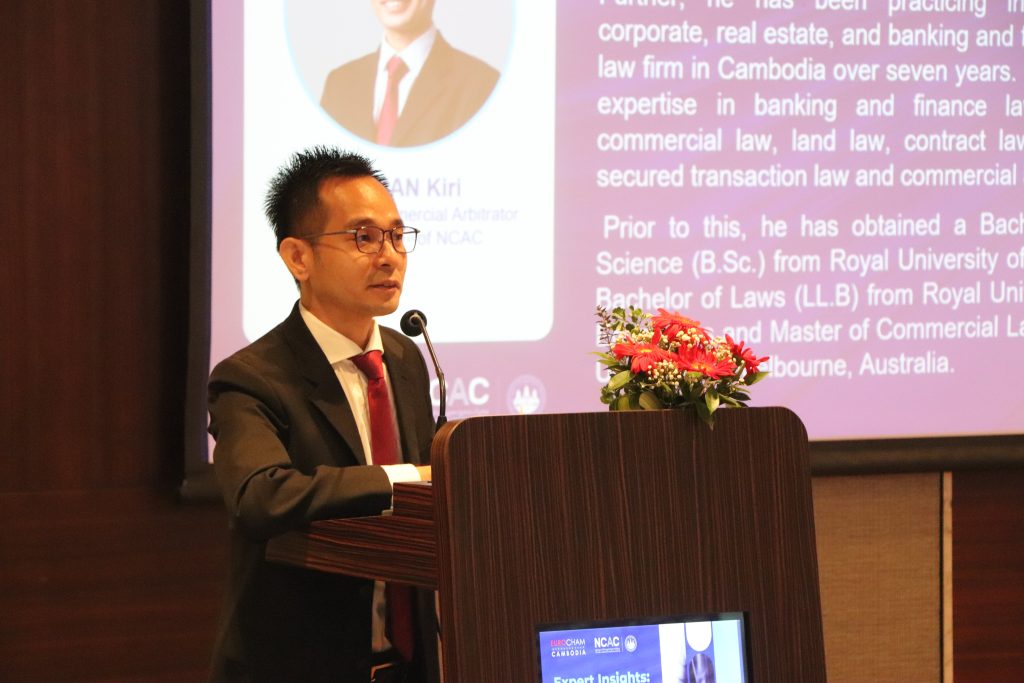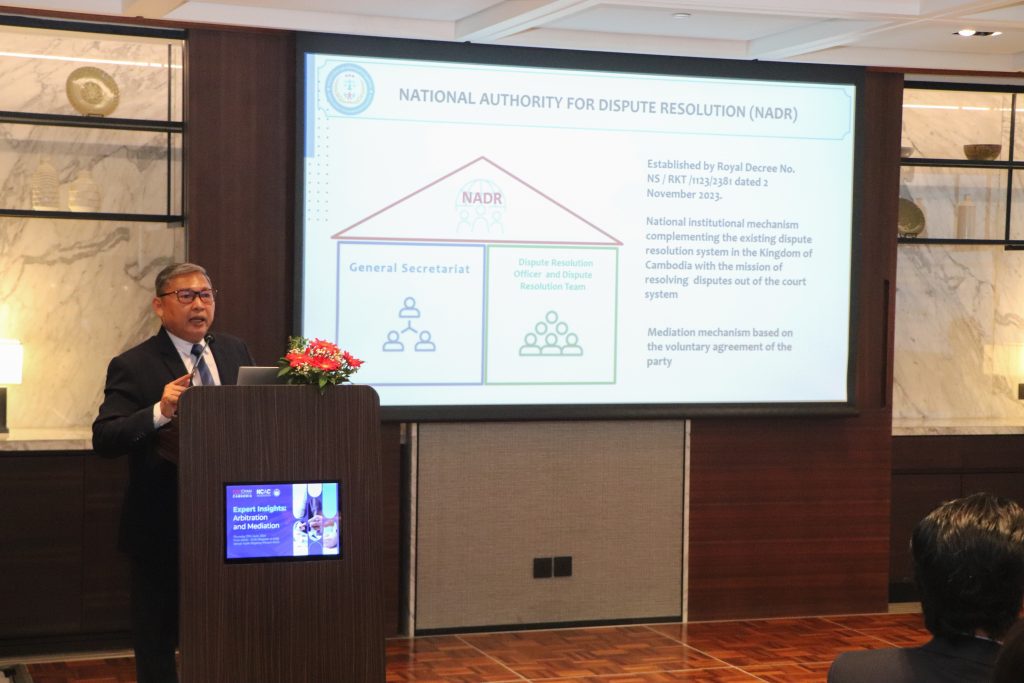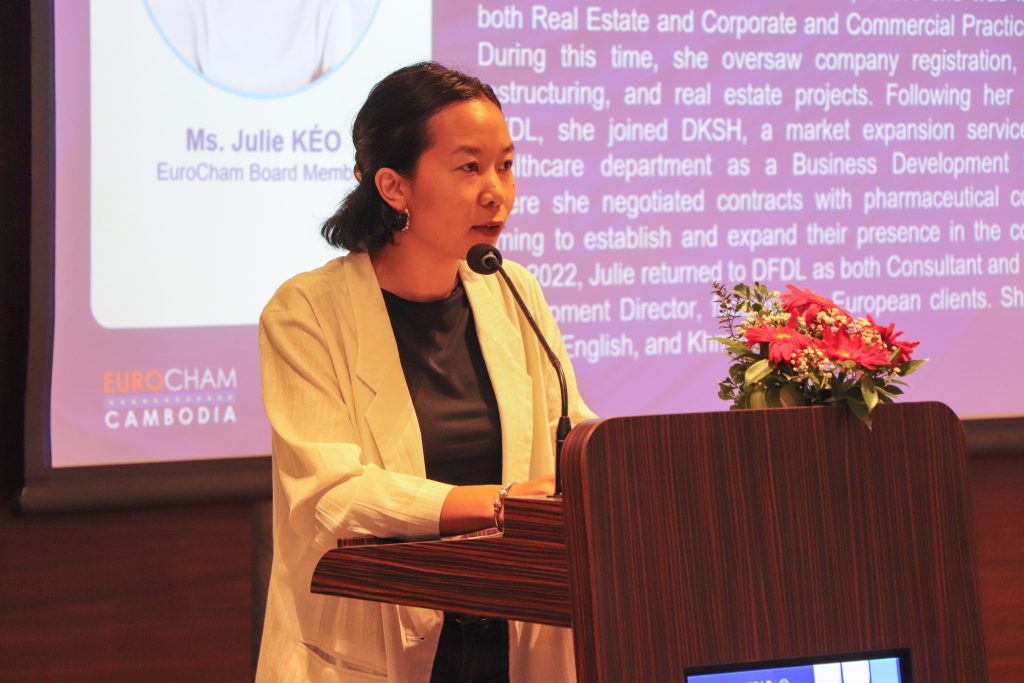Vijian Paramasivam
Cambodia has bolstered its reputation as a business-friendly nation with the enhancement of alternative dispute resolution (ADR) mechanisms, which offer a less formal and cost-effective alternative to traditional litigation. These mechanisms, including mediation and arbitration, are now integral to the government’s judiciary policy, providing business operators with efficient means to settle commercial disputes.
The Cambodian government is encouraging businesses to utilize ADR mechanisms to resolve conflicts, reflecting the evolving landscape of the financial and business sectors. As Cambodia expands its regional and international trade, ADR mechanisms are increasingly seen as vital in fostering confidence among domestic and international investors by ensuring ease of doing business and secure investments.
The High Costs Associated With Regional Arbitration Centers
At a recent seminar hosted by EuroCham Cambodia titled “Expert Insights: Arbitration and Mediation,” it was highlighted that Cambodia’s maturing economy is embracing modern dispute resolution instruments. EuroCham Board Member Julie Keo emphasized the importance of ADR in her opening remarks, stating, “Alternative dispute resolution contributes to a stable business environment in Cambodia because a robust alternative dispute resolution mechanism attracts foreign and European investments into the Kingdom. This event aims to raise awareness among the European business community to make sure they are familiar with the existing mechanism and know how to activate them.”
Keo also noted the high costs associated with regional arbitration centers, such as those in Singapore, which can be disproportionate to the size of the contracts involved. She highlighted the role of the National Commercial Arbitration Centre (NCAC) in providing a more cost-effective solution. “Thanks to the NCAC, now we have the opportunity to resolve any disputes arising out of transactions in Cambodia,” she said.

The establishment of the NCAC and the National Authority for Alternative Dispute Resolution (NADR) are key government initiatives aimed at advancing ADR as a viable alternative to the often cumbersome litigation process. NCAC President Kiri San described ADR as a user-friendly forum for disputed parties but emphasized the need for further changes in the legal frameworks to enhance efficiency. “The key benefits of commercial arbitration and mediation for resolving business disputes in Cambodia are costs and time efficiency, flexible procedures, confidentiality, neutrality and enforceable awards in both domestic and international courts,” Kiri told the Cambodian Investment Review (CIR).
Kiri also pointed out that arbitration awards made by the NCAC are enforceable in over 170 jurisdictions, as Cambodia is a signatory to the New York Convention on Commercial Arbitration. Since 2013, the NCAC has administered 42 cases involving parties from six different jurisdictions, with a total sum in dispute exceeding $100 million.
Improve The Quality, Efficiency, & Speed Of Dispute Resolution
Ministry of Justice Under Secretary of State and Member of the National Authority for Alternative Dispute Resolution Poch Sophorn reiterated the government’s commitment to promoting ADR. He noted that the NADR project has been expanded to remote and indigenous provinces in Cambodia’s northeast. “The purpose of the NADR is to reduce court case congestion, putting dispute resolution services closer to the local people and ensuring harmony and justice in society. We want to improve the quality, efficiency, and speed of dispute resolution through out-of-court mediation,” said Sophorn.
Read More: New Law on Public-Private Partnerships Promises to Reform Cambodian Development Projects
Between March and June this year, nearly 100 cases have been filed with NADR, covering disputes related to land, house rental agreements, construction contracts, heritage, and family matters. A notable achievement was the resolution of a 14-year-old civil dispute involving a loan agreement, which had progressed from the Court of First Instance to the Supreme Court.

Djamel El Akra, an arbitrator at the NCAC, stressed the importance of cultivating a culture of dispute resolution outside traditional litigation to address commercial disagreements effectively. “Conflict is inevitable. It’s essential to focus on the underlying causes of the conflict rather than the individuals raising the issue. Establishing formal ADR helps avoid self-help mechanisms or ignoring problems, providing an alternative way to access justice,” Djamel told CIR in an email interview.
Ease Congestion In The Courts, Which Are Often Clogged
The ADR mechanisms also help ease congestion in the courts, which are often clogged with cases that can take years to resolve. “By diverting cases from the overburdened court system, alternative dispute resolution helps improve the overall efficiency of the judiciary. This contributes to a more stable and predictable legal environment, further enhancing the country’s attractiveness for investment,” said Kiri. “A strong ADR system provides predictability in resolving disputes, which is crucial for investors. Knowing there is a fair, efficient, and reliable mechanism to address potential conflicts can significantly boost investor confidence.”

Howard Stoneham, owner of Mercator Global Consultants, underscored the efficiency of the arbitration process. “In my opinion, the beauty of the arbitration process is that the plaintiff has only to convince the arbitrator that his position is reasonable and within the bounds set by the applicable civil laws. I would always recommend to a client or potential client to opt for arbitration as it should bring about a swift resolution,” he told CIR.
As Cambodia continues to enhance its ADR mechanisms, the government’s commitment to legal and regulatory reforms signals a dedication to improving the business environment. These efforts are expected to attract further foreign direct investment, contributing to the growth of the business sector in the Kingdom.





